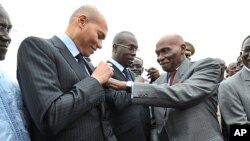Violent protests and opposition from his own party this week forced Senegalese President Abdoulaye Wade to give up changes that would have made it easier for him to win re-election. The reversal also disrupts Wade's plans for a vice presidency, which could have benefitted his son.
Objections to creating a vice president for Senegal focus chiefly on concerns, both within the ruling party and within the opposition, that President Wade would use that post to put his son, Karim, in place to succeed him.
Karim Wade is already a powerful member of his father's Cabinet. As minister of state for international cooperation, regional development, and infrastructure, he controls more than one-quarter of Senegal's federal budget, including the energy portfolio.
The French-educated banker suffered an electoral loss to Dakar's city council in 2009 when his father's opponents won control of the municipal council in a vote that shook up the ruling party. Despite that electoral defeat, President Wade has justified his son's pre-eminent role in his cabinet on the grounds of what he calls “exceptional competence.”
But there is a generation of leaders within the ruling party between the ages of the 85-year-old president and his 42-year-old son who have been waiting for their chance at power.
At present, the ruling party controls that choice with the president of the Senate first in the line of succession. If that position went to an appointed vice president without legislative confirmation, the choice would be entirely President Wade's.
Ruling-party parliamentarian Ndiogou Wack Ly believes the change would have been too confusing.
Ly says it is his opinion that either the post of the prime minister disappears or the post of the vice president disappears. He says Senegal can not have a messy regime with two people at the head.
Businessman Moustapha Dieng says Africa is no longer a place where leaders anoint their own successors.
'What is happening is a shame for Wade," he said. "It is a shame for West Africa. And it is a shame for all of the leaders sitting here who are trying to make their son or their friends or their lobby in the country. This can not continue.”
The prospect of Karim Wade succeeding his father through the vice presidency was a rallying point for this week's demonstrations in Dakar, with many people holding signs saying: “Senegal is not a dynasty.”
Dieng says Senegalese watched closely the political crisis in Ivory Coast where the incumbent president used the constitutional council to block the rightful winner.
"If you know this region, we have in other countries a lot of problems in kinds of democracies where those leaders come democratically in ruling the country and then try to bring down those constitutions that bring them up. And this is what we can not accept,” he said.
Senegal's ruling party says the changes were meant to “reinforce democracy” but President Wade listened to the Senegalese people, development partners, and religious leaders in agreeing to keep the constitution as it is through elections planned for February.
Senegal Protests Disrupt Plans for Vice Presidency




